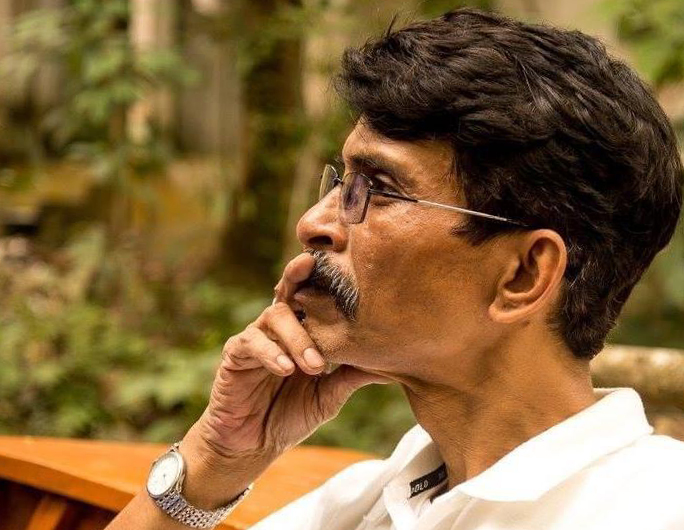One year after renowned Bangladeshi writer Mushtaq Ahmed died in jail, the circumstances of his death remain murky. While an investigative committee formed by the Home Ministry claimed he died of “natural causes,” his former lawyer Jyotirmoy Barua believes that Ahmed may have died of health issues that arose after alleged torture.
In May 2020, the Rapid Action Battalion, an elite unit of the Bangladeshi police under U.S. sanction since last year for gross human rights violations, detained Ahmed and cartoonist Kabir Kishore from their Dhaka residences and accused them of violating the Digital Security Act (DSA). A first information report, which opens a police investigation, accused Ahmed, Kishore, and four others of running the popular Facebook page “I am Bangladeshi,” which featured political and social commentary on COVID-19.
Kishore told CPJ after his release last March that men in civilian clothing detained him, interrogated him, and allegedly tortured him by repeatedly beating him in the head before taking him to a Rapid Action Battalion office. There, he found Ahmed and learned that he had been abused too. Ahmed “told me he was tortured by electric shock,” Kishore told CPJ. (It is not possible for CPJ to independently verify the allegations, but they are in line with details of abuse in custody in Bangladesh.)
Denied bail at least six times, Ahmed was in legal limbo for much of his detention. According to the DSA, authorities should have completed their investigation within 60 days, or sought an extension from a court. But his lawyer said that didn’t happen on time – authorities only filed a charge sheet after nine months of detention.
He languished in jail for more than nine months before he suffered a heart attack, reports said, and died on February 25, 2021; his family claims there was a three-hour delay before he was admitted to the hospital, according to the United Nations.
CPJ emailed the offices of Prime Minister Sheikh Hasina, Home Minister Asaduzzaman Khan, Law Minister Anisul Haq, Attorney General Abu Mohammad Amin Uddin, and Dhaka Metropolitan Police Commissioner Md Shafiqul Islam, for comment but did not receive any reply. Khandaker Al Moyeen, the director of the legal and media wing of the Rapid Action Battalion did not respond to CPJ’s request for comment sent via messaging app.
Barua, who represents formerly detained journalists Shafiqul Islam Kajol, Jamal Mir, and Mahtabuddin Talukdar, spoke to CPJ via video call about Ahmed’s alleged torture and death, the reaction inside Bangladesh, and the dangers of the law used to detain Ahmed and Kishore.
This interview has been edited for length and clarity.

How did you find out about Mushtaq’s death?
I saw a Facebook post by one of my lawyer friends. I was very surprised that jail authorities did not directly communicate with me or family about his death. It was completely unexpected. [I had expected that] in a couple of days, he was going to be released on bail.
In January 2021, I filed an application before the High Court division for bail for Mushtaq and Kishore. Due to the long list of cases, I had to wait for more than two months to get the matter heard. Mushtaq died on 25 February 2021. Subsequently, I managed to get the matter heard and Kishore was released on bail on 4 March 2021.
What was the reaction inside Bangladesh?
The reaction inside Bangladesh was furious. There were protests. Before Mushtaq’s death, I was one of the only people demanding the repeal of the Digital Security Act. After Mushtaq’s death, there was a radical change. More people, civil society organizations, and human rights defenders started asking for repeal of the law because it was so draconian that a writer like Mushtaq died in jail.
The unfortunate thing is that earlier police seized his personal gadgets, computer, and mobile phones. On behalf of his wife, we filed an application before the Dhaka Cyber Tribunal to return those things because they are not relevant in the case. But surprisingly, the judge refused without giving any proper reason as to why those items should be kept in the custody of the police. That evidence cannot be used against the other accused because these criminal allegations are a matter of personal liability. We are going to file another application before the High Court division on that issue.
What is your reaction to the Home Ministry’s March 2021 report that Mushtaq died of “natural causes”?
As Mushtaq’s lawyer, I expected that an independent inquiry should have been conducted into his death and the report should be published for public scrutiny. But now, other than some [basic details] the state provided to some newspapers, we do not know what is in that report.
I am not aware of any other health complications that Mushtaq experienced besides some difficulties with his eyes. He never mentioned that he was feeling seriously bad; otherwise, I would have filed an application for medical support.
The cause of death itself remains unclear. Kishore alleged that Mushtaq was tortured. If Mushtaq was not released, if he was not exposed otherwise by any other events between his arrest and his death, then the torture and death should be considered connected events. In a case of death like this, if we consider this as a kind of homicide, then the causation is quite a serious issue. The people who tortured him under the custody of the state should have been made liable for his death.
As soon as Mushtaq died, his body was handed over to the family and they had to complete the burial process straight away. We were so surprised that we could not even think straight at that time. The state said they conducted an autopsy report after he died, but his family and I did not see such a report. It could be torture. It could just have been a heart attack. Without access to the autopsy report or Home Ministry report, the death of Mushtaq remains completely unclear to us, even until today.
Law Minister Anisul Haq recently acknowledged that the Digital Security Act has been “misused and abused” and said that journalists would no longer face immediate arrest after a complaint is filed against them under the law. Are these actions enough to ensure that journalists will not face legal retaliation for their work?
I have been dealing with cases of journalists for the last couple of years. Especially during the COVID-19 period, journalists were the worst victims of the DSA. Jamal Mir and Mahtabuddin Talukdar were in jail for more than one year under DSA cases. They were denied bail many times.
After Mushtaq’s death, there was a reasonable conclusion that the use of the DSA was too harsh.
Although the Law Minister said repeatedly that a journalist will not be arrested immediately after a case is filed against them, actually the process is the other way around. In most cases, journalists are abducted or detained illegally having no case against them. If the police do not bring them in front of a magistrate after 24 hours, the detention becomes illegal under the Code of Criminal Procedure. Then, after two or three days, or a month later, they are implicated in the case under the DSA. In Mushtaq and Kishore’s case, they were picked up from their houses [and allegedly tortured] before a [first information report] was filed against them. [The first information report filed against Ahmed claimed he was arrested on May 5, when his wife told The Daily Star that he was in fact detained a day earlier.]
With regard to the DSA, I do not use the term “abused.” The law in itself is so vague, ambiguous and draconian that if someone uses it, that in itself is abuse. That is why we are calling for the law to be repealed.
What other mechanisms has the government used to target journalists?
Whether you speak about the DSA, the Official Secrets Act [a colonial-era law under which journalist Rozina Islam was detained in connection with her reporting on the COVID-19 pandemic], or the Bangladesh penal code, these are tools in hands of the state. The application of laws like the DSA and Official Secrets Act are about power. It is about how politicians are threatening the people of this country. People are being abducted, taken away forcefully from their residence without legal authority.
How should the world remember Mushtaq?
Mushtaq should be remembered as a writer and successful entrepreneur. He died for freedom of expression. Journalists should remember him as an icon, and continue raising their voices against violations of human rights and civil rights. They should not stop. They should not be afraid of any persecution because people are always there to stand by them. People should remember him as a fighter. He died fighting for his rights and the people of the country.
Editor’s note: The party responsible for Kabir Kishore’s initial detention and alleged torture has been corrected in the third paragraph; the name of the court that lawyer Jyotirmoy Barua approached on behalf of Mushtaq Ahmed’s wife has been corrected in the 14th paragraph.
